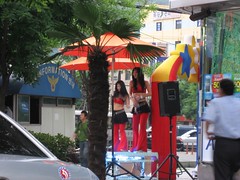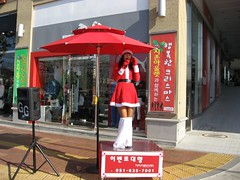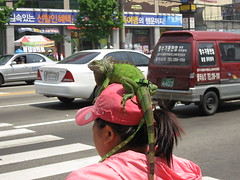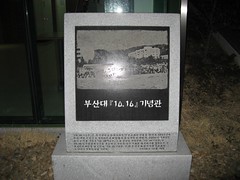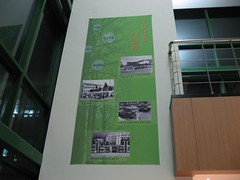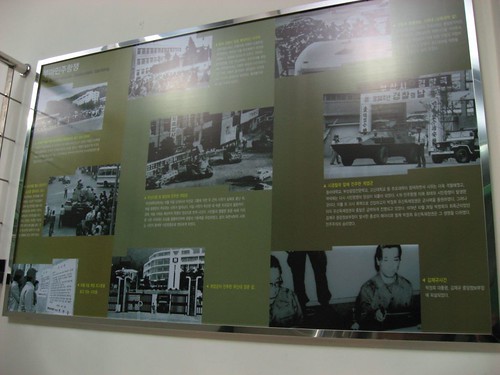"If you do not change direction, you may end up where you are heading." - Laozi
Saturday marked the one year anniversary of my arrival in Korea. I originally intended to stay for three to six months before finally deciding to do a full year in order to experience this country's
four seasons. We would have headed back home on Friday - if not before due to
my father's illness - but the
decision by the Entry Clearance Officer at the British Embassy to deny my wife a visa means that we're stuck here for the foreseeable future, and possibly forever. My temporary stay in Korea has thus turned into a fully-fledged government-enforced exile.
Some governments support capital punishment, but there's little doubt that innocent people are executed from time to time. What must it feel like to be killed by your own government when you know you are innocent, when there's nobody left to turn to because the government is the law and the law decides,
on the balance of probabilities, that your life is in their hands and that it should be terminated? Well, the reality is that it's not a situation most of us will face, but this is not to say that we can live our lives without fear of our governments declaring war on us as individuals in one respect or another - and sometimes all it takes is one bureaucrat passing judgement on some perceived and possibly incorrect aspect of your personal circumstances or character and then the entire apparatus of the State is against you. So I came to Korea, got told by my government that I wasn't intending to return to the UK to live - if you can make any sense of that whatsoever, and was thus prevented from returning - unless I separate from my wife and return alone with no guarantee that she will be able to follow.
To say that this has cast a shadow over my Korean experience would be an understatement. I don't do depression but pervading senses of unhappiness flavoured with generous helpings of angst I have down to a fine art. I suppose it's one of the reasons
Haruki Murakami is one of my favourite authors, and it's definitely one of the reasons I came to Korea - I needed change and I needed to find some sense of purpose which had ebbed away from me in the years before leaving. After a year here I can't say that I've found that purpose, but my experiences here have at least provided a distraction away from some of life's larger questions. The embassy's refusal to grant my wife a visa forced me to consider how I would feel about spending the rest of my life in Korea and I'm afraid to say that these have not been happy thoughts and as such, they have taken a toll on me personally. I could say that my year in Korea has not been a bad one and it would not be a lie, but that the prospect of being stuck here fills me with a sense of desperation may speak to a greater truth about my collective experience.
I'm a stock market trader and success relies on a large number of complex variables - we talk about '
being in the zone' without really understanding specifically what leads to this - but we know when we are. Since the Embassy decision my head hasn't been in the game and my performance has deteriorated almost as rapidly as my mood - I can point to specific instances of cause and effect as far as the link is concerned. The result is that I haven't made enough recently to justify the long and unsocial hours of doing it so I've decided to take a break from it.
A break is exactly what I need for another reason which has contributing to my growing frustration here, which are my language skills - or lack thereof. As of today, on testing my Korean vocabulary stands at 420 words and while I can sometimes make myself understood, and occasionally surprise people with an ability to relate something complex or abstract, the fact is that I have felt a growing sense of shame at my slow progress. I feel I have got a lot out of my time in Korea, but it would have been so much more had I taken the time to establish a foothold in the language when I arrived, instead of learning to read Korean very quickly and then failing to capitalise on that momentum as I got distracted by other things. If I could do it all over again that's certainly something I would change. Taking a break potentially frees up fifty hours a week for studying but even if I learn quickly I don't think I'll have the same sense of achievement that I would have had a year ago. There's also no guarantee that I'll make that commitment either - I was very motivated when I learned Japanese, but I've never had quite the same enthusiasm for Korean and I'm not sure I can magically discover it. I have a sense that I'm having to do this because of the Embassy decision, and anything I do because of that represents my tacit acceptance of the way they have manipulated the course of my life. But they have, and I have to adapt to it.
I mentioned Haruki Murakami. For me a constant underlying theme of his books are a sense of disconnection from society and normality. In this sense, my life in Korea could have been that of a character in one of his books. I have
existed within Korean society without actually being a part of it - even with friends and family here - where the
language barrier ensures that you often exist in a world of your own while life goes on around you. The fact is despite having a
Korean wife it's too easy for all our conversations to be in English and almost all hers with friends to be in her own language. So I derive little benefit from it, and in reality it may be hugely detrimental to my language development - because basically I have little actual need to speak Korean.
On a happier note I really have had lots of great experiences such as
baseball,
welcoming in the New Year on a very cold beach at dawn,
standing on the tops of mountains,
Busan Aquarium,
the outdoor PIFF cinema experience and
Cheonggye Stream on a summer's evening. Most of all though, I've enjoyed - as much as my lack of language skills have allowed - trying to understand the subtler aspects of Korean culture; sometimes it's the small things which can teach you a lot about a country and its people, and can in turn cause you to question values indoctrinated into you by your own society;. it's a journey of intellectual discovery as much as a geographical one. This is a country of
endless retail space - the economic viability of which I still don't understand, of
1,000 won per hour PC Bangs (another economic mystery), a relentless
food culture, mostly
great customer service, low-cost punctual subway systems, a
relatively cheap and efficient healthcare system and
limited government bureaucracy (at least in my experience).
On the other hand, I have new-found respect for the sensibility back home of
not allowing people with loudspeakers to sit under your window at five-thirty in the morning selling salt, I long for the smell of fresh air untainted by diesel fumes,
pollution from China,
dead fish and
sewer fumes, I fear the day I have to return to a
Korean dentist or am forced to embark on
another round of family obligations, I nervously check the news every day waiting for Korea to launch into
another round of foreigner bashing, and I wait for the day to come when a taxi or
bus driver finally kills us. Meanwhile
the war on mosquitoes continues, I cringe at some of the
animal cruelty and
general political incorrectness shown on TV, I watch BMWs weave past
limbless beggers dragging themselves on the floor through the streets, and my
search for pizza as good as the ones I used to eat back home continues despite endless disappointments.
Korea will change - indeed it has changed even during my brief time here. The number of foreigners increases by the month as do the number of foreign cars on the previously Hyundai and Daewoo dominated streets. Globalisation is slowly eating into Korean society and I have little doubt that for Koreans it will be a particularly tough evolution. Some will not want that kind of change and our generally gracious hosts may not always remain so. Someone once wrote that sociologically Korea today is like Japan of the early 1980s. I can't speak to that but I do feel that there is still much to discover here that remains largely unmoved by the bulldozer of Western values. Ten or twenty years from now this may well be a blander place, full of foreigners and Koreans speaking English which negates the need to learn Korean or even really understand the local people on their own terms. But Korea is not yet that place, and while I know my progress in assimilating has been slow, it is for this reason that I do not regret the time I have spent here, and I only wish to get more out of it in the future.
The Good
-
Busan Fireworks Festival
-
Busan Aquarium
-
New Year's sunrise on the beach
-
Baseball
-
Pusan Internation Film Festival
-
PNU
-
Nampodong
-
Haeundae
-
trips to Seoul and
Cheonggye Stream
-
the KTX high-speed train
- the efficient and cheap subway system
-
cheap and instant medical care
-
cheap glasses
- autumn
if it happens
-
monsoon season (
if it happens) - I like rain
-
DVD Bangs
-
PC Bangs
-
Kartrider
-
video game TV channels
-
endless consumer shopping and laughably false advertising
-
views from mountains
-
Korea by night
-
food vendors,
food culture and
cheap food
-
Korean pizza - not quite as the Italians intended but different
-
customer service
- relatively
cheap bills
-
no war on terror
-
Korean immigration
-
surprisingly simple Korean bureaucracy
The Not so Good
-
loudspeakers at 5.30am
-
getting called 'ajeossi'
-
family obligations and three day funerals
-
homeless in Busan and
Seoul
-
Haeundae (I have mixed feelings about this area)
-
Gyeongju in winter
-
Christmas, which basically isn't
-
Yellow Dust
-
summer
-
dentists
-
the smell
-
bus drivers and
airborne taxis
- North Korea
-
"Corea Fighting!",
this and
this
- a
certain social conservatism and
what you see on TV
-
Crazy Christians and other
people constantly knocking on our door
-
cockroaches
-
fighting mosquitoes in my apartment
- televised
animal fighting
-
general street fighting at all hours of the day
-
Microsoft Korea 2007™
-
Internet connection speed,
reliability and
censorship
-
safety culture, lack of
-
Korean pizza - show me the sauce
The Slightly Bizarre
-
love hotels
- the
local red-light district
-
night walking
-
everything else
Finally, I'd like to say a big thank you to the British Embassy in Seoul, who made it all impossible - the secret is to bang the rocks together, guys.
Korean tags: 요약, 기분, 직업, 대사관, 년




